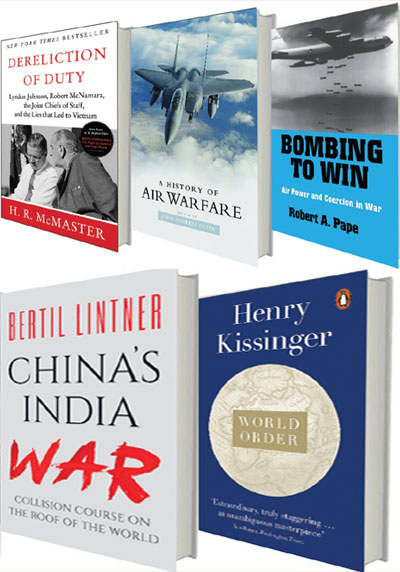 Air Vice Marshal Anil Golani (retd)
Air Vice Marshal Anil Golani (retd)
The habit of reading, which if inculcated can pay dividends beyond imagination. There are many who find books intimidating and the very thought of picking one up to read impulsively goads them to apparently easier, and in their conviction better pursuits like listening to music, playing a game or anything else that amuses them. This baggage, to an entire generation, probably comes from school days when thick fat syllabi books on mathematics, science, arts and history evoked an unwanted sense of repulsion.
Tantalising as they are, there are two things that must be remembered as far as books are concerned. Each book has a character and story of its own, which like human beings must never be judged from the external appearance or the cover. Secondly, it takes time to get to know a person and one has to invest time and patience in relationships, which comes out in any book as you turn the pages. The beauty of a good book is that one doesn’t have to make an effort to turn the page, you do it compulsively because it is ‘unputdownable.’ Slowly and surely, as the story unfolds one gets to understand the subject and the context in a matter of hours, that are required to finish reading the book. What one gets in a couple of hours through any book is the painstaking research of the author, which probably took him/ her many arduous hours of work spanning into months and maybe years.
Continuing with the ‘Reading List’ for those in the military, national security and aerospace domain, from practitioners to scholars, here is an additional list of five books that ought to be on their ‘must read’ list.
Dereliction of Duty by H.R. McMaster: It is extremely important to know why nations go to war. The common understanding being ‘national interest’ could more often than not be a fallacy. The United States went to war in Vietnam, losing 58,000 soldiers apart from more than two million on either side in Vietnam, in a conflict that tested the mettle of a modern and well-equipped force against a guerrilla insurgency. From Dwight Eisehower, John F Kennedy, Lyndon Johnson and Richard Nixon, this war turned out to be an acid test of US supremacy through successive US Presidents. This book unravels through painstaking and dogged research the web that was built by Lyndon Johnson, Robert McNamara and Maxwell Taylor that prevented the Joint Chiefs of Staff from performing their duty. A chilling indictment of the civilian and military leadership of the day, this book also addresses difficult questions about senior officials’ responsibility to their service, constitution, the political leadership and the nation. Coming from a practitioner, McMaster’s call to military leaders to hold themselves to the highest standards of professional integrity: this book is a ‘must read’ for all men and women in uniform.
A History of Air Warfare Edited by John Andreas Olsen: ‘History’ someone famously said is ‘a pack of lies, written by people who were not present.’ Air power is still in its infancy, being a little over a century since its evolution, even though technology has ensured its progress in leaps and bounds. Being technology intensive, airmen often measure the efficacy of air power through the prism of technology and precision targeting. It is important however, to understand the context, strategy, application of force and the ways and means to achieve the desired end state. It is towards this that this book examines the history of Air Warfare from the First World War to the second Lebanon war. Chronologically covering all major conflicts through the third dimension, exposing the strengths and weaknesses of air power with the challenges of joint warfighting by sixteen distinguished authors, this book is a virtual treat for air power enthusiasts. Each author has carried out a factual case study of the conflict, providing an interpretation of the conduct of operations and the strategic outcomes of the war. It is important to interpret and learn from history so as to be prepared in the present, for future conflicts.
 Bombing to Win—Air Power and Coercion in War by Robert A. Pape: Coercion and deterrence, interminably linked, are two sides of the same coin when viewed in military terms. The former forces the adversary to change its behaviour while the latter precludes him from doing so, both employing the use of force or the threat of using force. It is towards this attribute of air power, the use of force, that this book aims to fill an important gap by carrying out a detailed analysis of the strategic effectiveness of bombing, from World War II to the Gulf War. Why some campaigns failed while others succeeded in using air power to coerce or deter, is important to understand, not only for its practitioners but also for the political decision-makers as any lack of understanding of this important element of national power can lead to disastrous consequences. Needless to say, this book must be read to enable a deeper understanding of the subject in the present scenario where air power is more often than not propagated as the instrument of choice to project force. Pape, in this book convincingly argues that air power is no ‘magic bullet’ and victory if any will not be without consequences.
Bombing to Win—Air Power and Coercion in War by Robert A. Pape: Coercion and deterrence, interminably linked, are two sides of the same coin when viewed in military terms. The former forces the adversary to change its behaviour while the latter precludes him from doing so, both employing the use of force or the threat of using force. It is towards this attribute of air power, the use of force, that this book aims to fill an important gap by carrying out a detailed analysis of the strategic effectiveness of bombing, from World War II to the Gulf War. Why some campaigns failed while others succeeded in using air power to coerce or deter, is important to understand, not only for its practitioners but also for the political decision-makers as any lack of understanding of this important element of national power can lead to disastrous consequences. Needless to say, this book must be read to enable a deeper understanding of the subject in the present scenario where air power is more often than not propagated as the instrument of choice to project force. Pape, in this book convincingly argues that air power is no ‘magic bullet’ and victory if any will not be without consequences.
China’s India War—Collision Course on the Roof of The World by Bertil Lintner: A prolific writer on Asia’s politics and history, with 17 books to his credit, Bertil Lintner in this book attempts to dispel some popular myths on the Indo-China border dispute and the events leading to the 1962 war between the two countries. Having travelled extensively in India’s Northeast, Nepal, Bhutan and interviewing scores of people apart from going through archived history and available literature, Lintner has convincingly argued that China’s aggression in 1962 was only a small move in the larger strategic game that China was playing to become a world power. Recent events have only been prescient to the author’s claims in the book that was first published in 2018. This book also gives an insight on how false narratives influence perceptions and affect policies of governments at the highest level. Meticulously researched, this book is a must read for soldiers, scholars and policy makers to gain a better understanding of China’s strategy, not only towards India, but its neighbourhood bordering China.
World Order by Henry Kissinger: A reflection on the character of nations and the course of history, this book penned by Henry Kissinger who was at the forefront as tumultuous changes took place in the ‘world order’ must be read by those who wish to understand the drivers of strategy and statecraft. In the book, having identified four great ‘world orders’ in history, from the European, Islamic, Chinese and American, the author from a lifetime of historical research and being a practitioner of statecraft, aims to identify the factors that have shaped the histories of nations. The issues of state legitimacy and power, relations between states and the drivers of conflict, as viewed by the author through his painstaking research become even more relevant in the ever evolving and changing contemporary world order.

